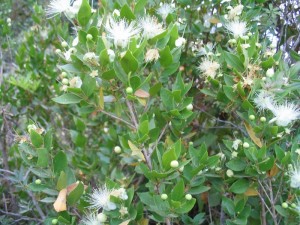Myrtus, with the common name myrtle, is a genus of flowering plants in the family Myrtaceae, described by Linnaeus in 1753. Myrtus communis — Common myrtle; native to the Mediterranean region in southern Europe
Contents
Uses
- People take myrtle for treating lung infections including bronchitis, whooping cough, and tuberculosis. They also take it for bladder conditions, diarrhea, and worms.
Benefits
- Respiratory Conditions: As mentioned, myrtle essential oil is very popular in aromatherapy, and is commonly used to alleviate respiratory conditions, such as bronchitis and asthma. It soothes the respiratory tract and allows for clear passage of oxygen, while also calming the body, so breathing is slowed and irritation is eliminated.
- Skin Health: Myrtle has been found to effectively clear up acne and other imperfections on the skin. It should topically be applied in its essential oil form, often in another carrier oil or in very limited concentrations. The organic compounds and powerful antioxidants in myrtle can help the cells heal quicker and improve the appearance of those affected areas. In its herb form, it can be consumed to see similar effects working from the inside out!
- Immune System: There has been a wide scope of research detailing the antibacterial and anti-parasitic nature of myrtle. For this reason, many people turn to this herb in order to boost the strength of their immune system.
- Hormone Balance: Extensive research has been conducted around the world regarding the effects of myrtle essential oil on the endocrine system, primarily in regulation of the thyroid gland. It has been shown that myrtle essential oil, whether consumed or inhaled, can positively effect the release of hormones, including those related to the ovaries and women’s reproductive health.
- Cancer Prevention: Myrtle is perhaps most highly praised for its high levels of antioxidants, including quercetin, tannins, myricetin, and catechin. These antioxidants have been widely studied and have been found to have anti-carcinogenic and anti-mutagenic properties. Myrtle is quite similar in chemical composition to sandalwood, which has been connected to a reduction in prostate and breast cancer. Ongoing research is still discovering more potential applications in the field of cancer for myrtle.
- Kidney Health: One of the ancient applications of myrtle leaves was for the treatment of urinary tract or kidney issues. Myrtle can help to stimulate urination, thereby eliminating excess toxins, salts, fluids, and even fat, thereby helping to regulate the functions of your kidneys.
- Cognitive Booster: Myricetin is one of the most important flavonols that are found in myrtle. It has been found to inhibit the formation of beta-amyloid fibril, which means that it is a very powerful aid for people suffering from Alzheimer’s and dementia. The therapeutic use of myrtle leaves and berries can keep your mind clear and prevent the degradation of neural pathways that leads to these terrible cognitive disorders.
- Heart Health: The various flavonoids found in myrtle, including myricetin, have been shown to reduce the oxidization of bad cholesterol(LDL cholesterol), which means that your cholesterol levels will remain balanced, your blood vessels and arteries won’t be clogged, atherosclerosis won’t occur, and your cardiovascular system will be protected from coronary heart disease and strokes.
- Diabetic Control: Although the jury is still technically out on this health benefit of myrtle, early reports indicate that the volatile compounds and flavonols in myrtle can reduce blood sugar plasma, which means that it would be able to help regulate blood sugar in the body. This would be a major boost for diabetic patients who need to monitor their blood glucose levels at all times.
Cautions
- Like the majority of essential oils, myrtle essential oil should only be used in extremely small doses if consumed or applied topically. Consuming myrtle leaves as an herb or eating the fruits is safe, but when it comes to the essential oil, consult with a professional aromatherapist or alternative healer before consuming or applying the oil. It can have very serious side effects if consumed in too high a quantity.
Interactions
Unknown, please consult with your doctor.
Other names
Arrayán, Common Myrtle, Mirto, Murta, Myrte, Myrte Commun, Herbe du Lagui, Myrti Aetheroleum, Myrti Folium, Myrtus communis, Nerte, Roman Myrtle, True Myrtle
References
Source: Wikipedia, https://en.wikipedia.org/wiki/Myrtus

